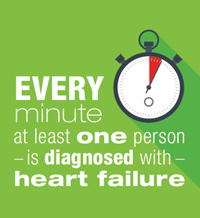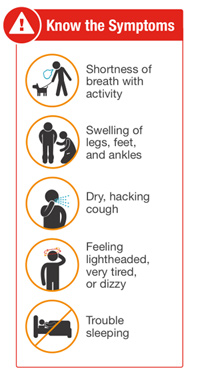Mend a Failing Heart

Heart failure occurs when the heart is unable to pump enough blood to meet the body’s needs. This condition affects nearly six million Americans annually and is often unrecognized or misdiagnosed. It’s important to know the causes and symptoms of this condition, as early diagnosis can help patients live an active life.
 Know the symptoms:
Know the symptoms:
- Shortness of breath, which can happen even during mild activity
- Difficulty breathing when lying down
- Weight gain with swelling in the legs and ankles
- General fatigue and weakness
Know the causes:
- Previous heart attack
- Heart defects
- High blood pressure
- Diabetes
- Alcohol or drug abuse
 Types of heart failure:
Types of heart failure:
- Left-sided heart failure occurs when a heart can’t handle pumping the amount of blood it needs, making it work harder and prohibiting the body from getting the oxygen levels it requires to survive.
- In right-sided heart failure, a heart loses pumping power, causing blood to back up in the blood vessels and swelling and blood retention in areas such as the ankles and legs.
- Congestive heart failure is a heart weakness that leads to a buildup of fluid in the lungs and surrounding body tissues, causing congestion.
Treatment options
Heart failure treatment is not linear — many factors impact treatment options. Once evaluated, patients may receive medication to strengthen and manage their heart. In some cases, advanced therapies are needed, which include a heart pump or heart transplant.
UF Health cardiologists and cardiovascular surgeons work together to treat patients with heart failure and offer the latest in treatment options, including:
- Medical management
- Pacing and cardioverter-defibrillator device implantation and management
- Access to investigational mechanical support devices and pharmacologic agents
- Ventricular assist devices – a device that helps the heart pump blood from one of the main pumping chambers to the rest of your body or to the other side of the heart. These pumps may be implanted in your body or connected to a pump outside your body.
- Heart transplant
The prevalence of heart failure in America and other growing complex cardiac cases has led UF Health to our most ambitious endeavor to date – a new facility built around the needs of patients with heart and vascular conditions. Every detail of the new UF Health Heart & Vascular Hospital, opening in December 2017, is built with patients and their loved ones in mind.

Key features include:
- Streamlined access to highly specialized, comprehensive outpatient and inpatient services in one location
- Aesthetic design that promotes patient safety, healing and recovery
- Patient rooms feature natural light and a slightly recessed family space with convertible furniture, encouraging loved ones to stay for support
- Third floor features an open terrace situated on a “green roof” for fresh air and natural light, and also includes free Wi-Fi and telemetry, a remote monitoring system for patients who need constant heart function monitoring
- Outdoor entrance space features healing garden that includes a reflection pond, waterscapes and outdoor walkways
- Specially designed “water-friendly” bathrooms are accessible for people with disabilities and accommodate a wheelchair or walker
- Sanctuary of Wisdom available for prayer and contemplation for people of all religious and spiritual interests
- Dedicated parking garage features 600 spaces for patients and visitors
- Infotainment system with large flat-screen TV monitors and interactive bedside tablets for patients and family members to use for patient education, hospital information and entertainment
Learn more about the new heart hospital at UFHealth.org/BuiltAround or our UF Health Heart and Vascular Care program at UFHealth.org/heart.